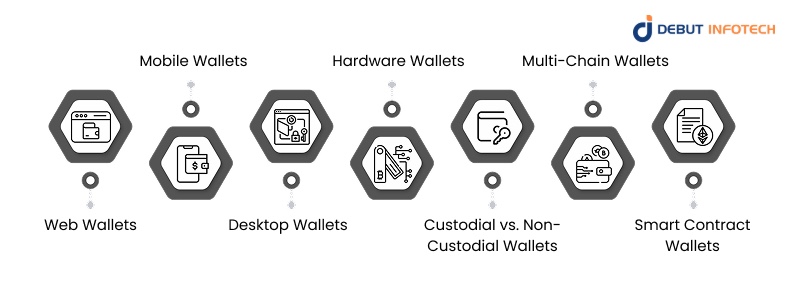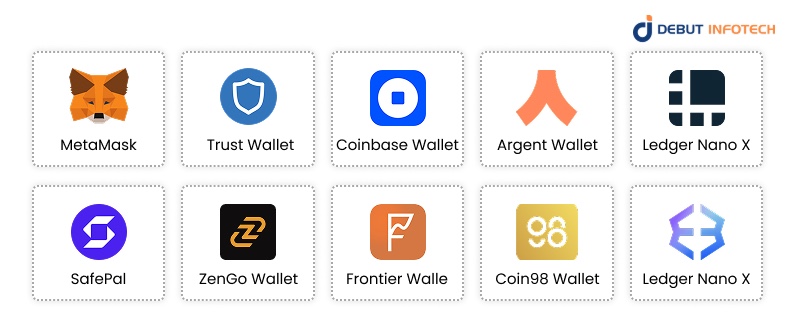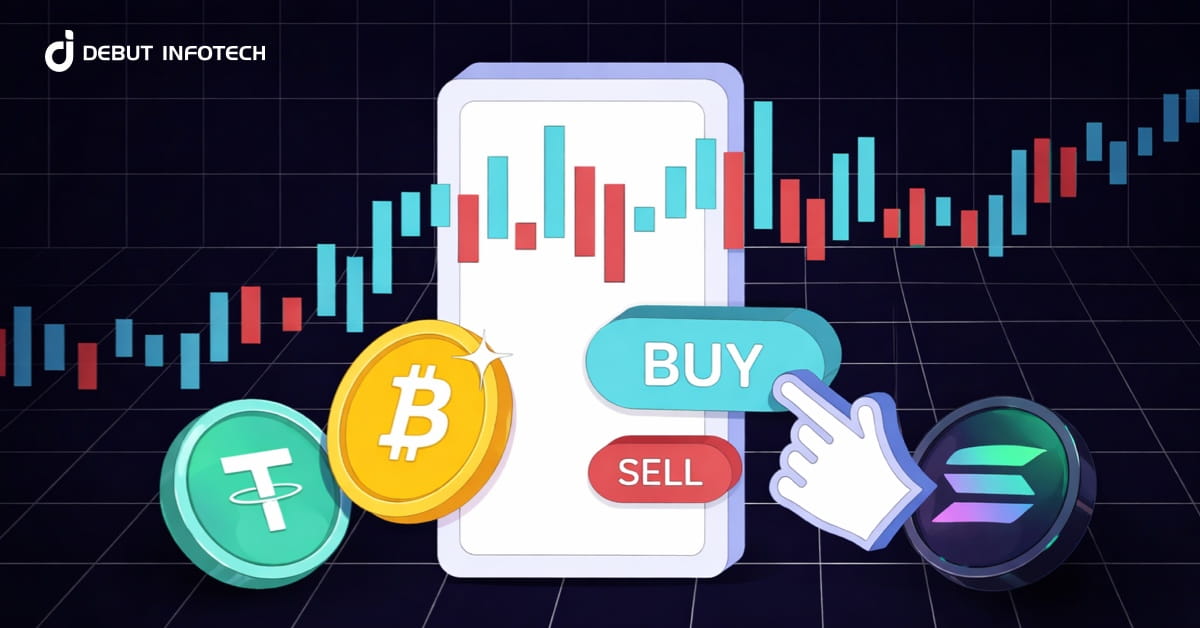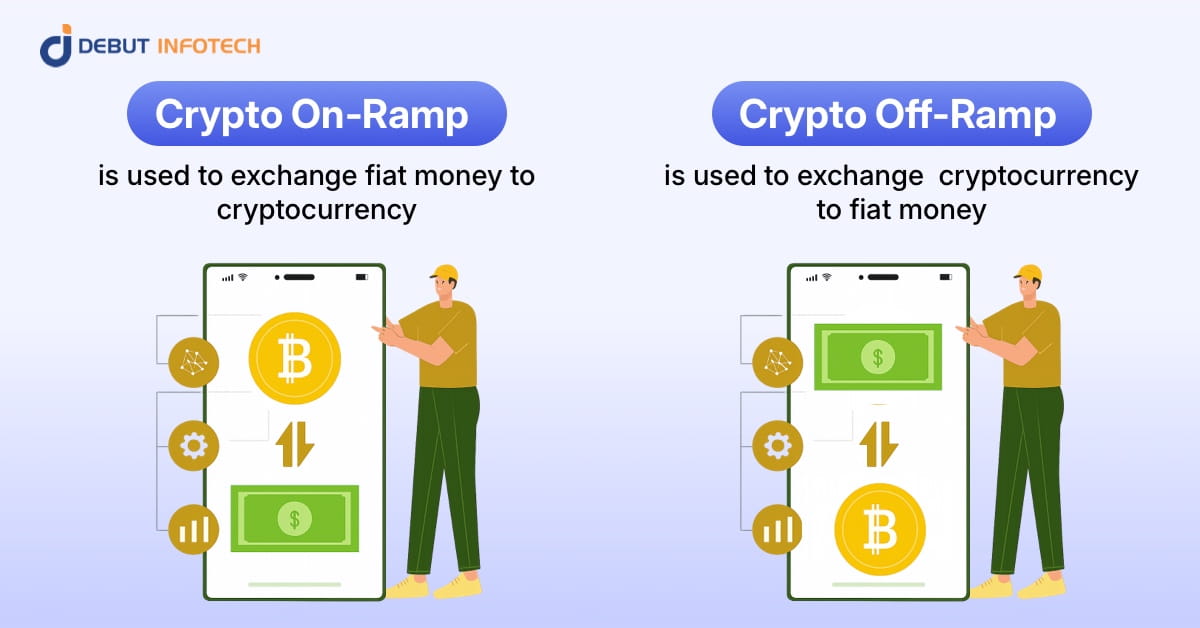Table of Contents
Home / Blog / Cryptocurrency
Top 10 DeFi Wallets to Choose in 2025
October 28, 2025

October 28, 2025
With the further growth of the decentralized finance ecosystem, DeFi wallets are becoming increasingly important to users who can independently manage their digital assets. In contrast to traditional wallets, which rely on centralized exchanges, DeFi wallets provide you with full access to your personal key, allowing you to store, exchange, and stake cryptocurrencies safely without intermediaries. With an increasing number of individuals venturing into DeFi staking sites, lending, and yield farming in 2025, the correct crypto DeFi wallet will be central to their successful and effective navigation of this emerging financial landscape.
As an investor seeking to maximize DeFi yield, a developer exploring the development of a DeFi wallet, or a business looking to create its own DeFi wallet application, this guide helps you make informed decisions by understanding the most preferred DeFi wallets. This guide covers the 10 best DeFi wallets of 2025, including their key features, security, and how they fit into the ever-evolving DeFi ecosystem. It also indicates what makes a wallet really safe, what does not, and how companies such as Debut Infotech, a pioneering DeFi wallet development firm, are defining the future of decentralized wallets.
Ready to Build Your Own DeFi Wallet?
Empower your business with secure, scalable wallet solutions tailored to the DeFi ecosystem.
What Is a DeFi Wallet?
A DeFi wallet is a non-custodial wallet that allows users to hold and manage cryptocurrencies without relying on centralized platforms. Unlike exchange-based wallets, users retain complete control over their private keys, meaning no third party can freeze or access their funds.
These wallets serve as gateways to decentralized finance applications, ranging from DeFi lending platforms to DeFi staking platforms, allowing users to participate directly in yield farming, liquidity provision, and governance token staking. Essentially, a DeFi wallet acts as your secure key to the blockchain ecosystem, supporting DeFi coins, NFTs, and a wide range of tokens built on Ethereum, Binance Smart Chain, Polygon, and other networks.
Read more – List of Top 10 DeFi Development Companies
Why Choosing the Right DeFi Wallet Matters
In the rapidly growing decentralized economy, not all wallets are built the same. The choice of wallet determines your experience, safety, and accessibility across decentralized finance (DeFi) protocols.
A good DeFi wallet app does more than just store crypto—it acts as a full-fledged gateway into the DeFi world. It should offer:
- Cross-chain support: Access to multiple blockchains like Ethereum, Solana, Avalanche, and BSC.
- Seamless integration: Compatibility with DeFi aggregators, yield farming tools, and decentralized exchanges.
- Advanced security: Non-custodial key management, biometric locks, and backup recovery.
- Ease of use: A simple UI for beginners yet flexible for advanced users.
As the DeFi landscape expands, many businesses are collaborating with experienced crypto wallet developers to build customized, white-label wallets for their platforms. These professional-grade solutions combine usability, scalability, and compliance, enabling enterprises to provide safe and user-friendly DeFi access to their clients.
Key Features of a Reliable DeFi Wallet
When exploring the best DeFi wallets, certain features distinguish a good option from an average one:
- Private Key Ownership: Ensures complete user control and ownership of the private key.
- Multi-Chain Support: Ability to hold tokens across multiple blockchains.
- DeFi Integration: Seamless access to DeFi protocols like Uniswap, Aave, and Compound.
- DeFi Tracker Tools: Helps users monitor investments, yields, and liquidity positions in real-time.
- Secure Backups: Recovery Phrases and Cold Storage Compatibility.
- User Experience: Smooth navigation and integration for both mobile and desktop users.
These capabilities enhance accessibility and security, ensuring both individuals and businesses can engage safely with decentralized finance.
Types of DeFi Wallets
Before deciding which of the best DeFi wallets suits your needs, it’s essential to understand the different types available on the market. Each type offers a unique combination of security, functionality, and accessibility. Whether you’re a casual crypto enthusiast or an institutional investor exploring DeFi wallet development, understanding these categories helps you make informed decisions.

1. Web Wallets
Web-based DeFi wallets operate directly within your browser, providing instant access to decentralized applications (dApps). They are ideal for quick interactions with DeFi lending platforms, staking pools, or token swaps. However, since they are connected to the internet, users must remain vigilant and choose wallets with robust auth token systems and multi-factor authentication.
2. Mobile Wallets
A mobile DeFi wallet app brings decentralized finance to your fingertips, perfect for users who want to manage assets, track DeFi yields, or monitor their portfolios through a DeFi tracker. Mobile wallets often include biometric security and real-time notifications, making them both convenient and secure. Businesses focusing on DeFi wallet development services often prioritize mobile-first solutions due to the growing adoption of smartphones in crypto investing.
3. Desktop Wallets
Desktop wallets are software programs installed directly on personal computers. They provide users with complete control over their private keys and integrate seamlessly with DeFi staking platforms and lending protocols. These wallets are best suited for advanced users who want maximum security while engaging in complex DeFi lending platform development or trading multiple DeFi coins across ecosystems.
4. Hardware Wallets
Hardware wallets remain the gold standard for crypto security. They store private keys offline, protecting assets from hacks and DeFi wallet scams. Although they lack the instant convenience of web or mobile wallets, they’re the go-to choice for long-term holders and institutional investors managing high-value portfolios. Many users pair hardware wallets with DeFi interfaces for safer transaction signing.
5. Custodial vs. Non-Custodial Wallets
Custodial wallets are managed by a third party that holds the user’s private keys on their behalf. They are simple to use but introduce counterparty risk. Non-custodial wallets, on the other hand, align with DeFi’s core principle of decentralization, granting users complete control over their funds. Most DeFi wallet development companies, including Debut Infotech, focus on creating secure, non-custodial wallet architectures that empower users with complete autonomy and control over their funds.
6. Multi-Chain Wallets
With the rise of interoperability, multi-chain wallets are gaining popularity. They support several blockchain networks, including Ethereum, BNB Chain, Avalanche, and Polygon. Multi-chain wallets enable users to interact with multiple DeFi ecosystems simultaneously, eliminating the need to switch apps and enhancing accessibility and liquidity. This flexibility makes them a strategic focus for crypto wallet developers building cross-chain solutions for businesses.
7. Smart Contract Wallets
Smart contract wallets go beyond basic storage. They use programmable contracts to automate transactions, staking, and governance functions. These wallets can trigger actions based on specific conditions, for instance, auto-claiming rewards or reallocating tokens between liquidity pools. For enterprises, adopting smart contracts in DeFi wallet development simplifies complex financial operations.
Related Read: Exploring Advanced Concepts in Cryptocurrency Wallet Development
Top 10 DeFi Wallets to Choose in 2025
The DeFi space has matured, and 2025 offers a variety of sophisticated wallets catering to investors, developers, and enterprises. Here are the top contenders:

1. MetaMask
One of the pioneers in the DeFi ecosystem, MetaMask, remains the most popular crypto DeFi wallet in 2025. It supports multiple EVM-compatible chains, offers built-in swaps, and integrates seamlessly with nearly every decentralized app.
Its browser extension and mobile versions provide users with complete control over private keys, while its recent multi-chain updates enhance usability across Ethereum Layer 2s. MetaMask is ideal for users engaging in DeFi staking platforms or NFT marketplaces.
Key Features:
- Supports Ethereum, Layer-2s, and multiple EVM-compatible chains.
- Built-in token swaps and NFT integration.
- Available on both web and mobile with private key ownership.
2. Trust Wallet
Owned by Binance, Trust Wallet offers comprehensive blockchain coverage, supporting over 65 blockchains and thousands of DeFi tokens. Its mobile interface allows staking, swaps, and DApp access directly from the app.
With in-app charts and a built-in DeFi tracker, Trust Wallet is ideal for users seeking convenience and functionality, renowned for its simplicity. It is widely used in DeFi yield and farming activities.
Key Features:
- In-app staking, swaps, and yield tracking.
- Intuitive interface with charts and analytics.
- Access to thousands of DeFi coins and DApps.
3. Coinbase Wallet
While Coinbase Exchange is centralized, Coinbase Wallet is fully non-custodial. It integrates tightly with DeFi protocols, providing direct access to DeFi lending platforms, including Compound and Aave. It’s one of the best DeFi wallets for beginners transitioning from centralized exchanges to self-custody while maintaining a familiar user interface and strong security standards.
Key Features:
- Non-custodial with private key control.
- Built-in connection to top DeFi lending platforms.
- Easy migration from centralized exchanges.
4. Argent Wallet
Argent simplifies DeFi for non-technical users. It offers keyless recovery, eliminating the risk of losing seed phrases. Users can earn interest directly on DeFi coins through integrations with Yearn and Aave.
Its built-in DeFi wallet support and gas-saving features make it ideal for users who want convenience and safety combined with smart contract-based security.
Key Features:
- Keyless access and social recovery system.
- Built-in DeFi integrations with Aave, Yearn, and Compound.
- Gas-saving transactions via Layer-2 networks.
5. Ledger Nano X (with Ledger Live)
Ledger Nano X merges cold storage with DeFi connectivity. When connected to the Ledger Live app, users can stake, swap, and track assets while maintaining offline storage of their private key. It’s particularly valuable for long-term holders and institutions looking for hardware-level protection against DeFi wallet scams.
Key Features:
- Offline private key storage for enhanced safety.
- Integration with Ledger Live for staking, swaps, and tracking.
- Multi-chain support across major blockchain platforms.
6. SafePal
SafePal, backed by Binance, offers both hardware and mobile wallet solutions. It supports over 15 blockchains and more than 10,000 tokens. Its DeFi aggregator tool enables users to compare yields across platforms, optimizing returns.
For those concerned about safety, SafePal’s offline QR-code signing ensures transactions remain secure even when the device is not connected to the web.
Key Features:
- Supports 15+ blockchains and over 10,000 tokens.
- Offline QR-code transaction signing.
- Built-in DeFi aggregator for comparing yields.
7. ZenGo Wallet
ZenGo uses facial recognition instead of seed phrases for access, reducing human error. It supports staking, swaps, and DeFi token development projects built on Ethereum and Polygon.
With cutting-edge encryption and 24/7 recovery, ZenGo bridges the gap between security and simplicity for both individual and enterprise users.
Key Features:
- No seed phrase required; uses MPC encryption.
- 24/7 recovery and backup system.
- Supports swaps, staking, and DeFi token development projects.
8. Frontier Wallet
Frontier positions itself as a full-featured DeFi gateway. It aggregates assets across multiple wallets, providing one unified interface.
Users can stake assets, lend on decentralized finance (DeFi) lending platforms, and participate in governance votes directly through the wallet. Its DeFi tracker feature simplifies portfolio management for multi-chain users.
Key Features:
- Aggregates multiple wallets into one dashboard.
- Enables staking, lending, and governance participation.
- Built-in DeFi tracker for yield performance.
9. Coin98 Wallet
Coin98 Wallet stands out for its multi-chain bridge and built-in DApp browser. It supports more than 50 networks and integrates with DeFi development services across Asia and the Middle East.
Coin98’s dual interface (basic and pro) caters to both novice and advanced traders looking to explore DeFi yield and liquidity pools.
Key Features:
- Supports over 50 blockchain networks.
- Built-in DApp browser and token bridge.
- Dual-mode interface for novice and advanced users.
10. Exodus Wallet
Exodus combines beautiful design with deep functionality. It offers support for over 250 assets and connects with Trezor hardware wallets for enhanced security.
With built-in DeFi staking options and seamless token swaps, it’s an excellent choice for users who prefer a desktop-first experience.
Key Features:
- Supports 250+ assets and integrates with Trezor hardware.
- Built-in staking and token swaps.
- Desktop and mobile compatibility with a focus on crypto wallet development standards.
DeFi Wallets and the Broader Ecosystem
DeFi wallets are more than storage solutions; they’re central to the decentralized economy. They connect users to:
- DeFi aggregators that optimize investment returns.
- DeFi lending platforms for borrowing and staking.
- Decentralized exchanges (DEXs) facilitate peer-to-peer trades.
- DeFi staking platforms for earning yield on idle assets.
As businesses look to innovate, many are investing in crypto wallet development to offer branded, secure, and customized DeFi experiences. With the support of expert blockchain consultants, companies can seamlessly integrate wallets into DeFi ecosystems, ensuring compliance, security, and scalability.
The Role of Debut Infotech in DeFi Wallet Development
As a leading DeFi wallet development company, Debut Infotech builds secure, scalable, and feature-rich wallets tailored for the evolving DeFi market. From design and UI to smart contract integration, the company provides full-spectrum DeFi development services that meet enterprise-grade standards.
Whether it’s crypto wallet development, DeFi staking platform creation, or DeFi token development, Debut Infotech ensures high performance, security, and interoperability. The firm’s blockchain experts empower businesses to create solutions that enhance accessibility while reducing operational risks in decentralized finance.
Read also – A Comprehensive Guide to Developing an Advanced White Label DeFi Wallet
The Future of DeFi Wallets
The future of DeFi wallets lies in convergence and innovation. Expect:
- AI-driven portfolio management: Wallets that use data insights to optimize yields.
- Cross-chain interoperability: Seamless movement of assets between chains.
- Institutional adoption: Enterprises using DeFi wallets for corporate treasury management.
- Regulatory alignment: Wallets that meet KYC/AML standards without compromising decentralization.
As the DeFi landscape matures, wallets will evolve beyond storage, becoming intelligent financial companions that enable automation, lending, and governance within a single unified interface.
Looking to Integrate DeFi Features Into Your App?
Partner with Debut Infotech — your trusted DeFi wallet development company — and transform your blockchain vision into a reality.
Conclusion
In the fast-paced world of decentralized finance, DeFi wallets represent freedom, control, and opportunity. Whether you’re managing multiple DeFi coins, exploring DeFi lending platforms, or building your own wallet through DeFi wallet development, the right wallet choice determines your experience and safety.
Forward-thinking companies like Debut Infotech are pioneering wallet innovations that simplify blockchain adoption while empowering users with autonomy and control. As DeFi continues to expand globally, secure, interoperable, and intelligent wallets will define how individuals and enterprises engage with the financial systems of the future.
Frequently Asked Questions
A. A DeFi wallet is a non-custodial cryptocurrency wallet that allows us to store, trade, and stake digital assets without relying on intermediaries. It gives complete control over private keys and funds.
A. DeFi wallets are generally safe when users follow best security practices such as using strong passwords and enabling two-factor authentication. However, safety also depends on the wallet provider’s credibility and the security of the nd smart country.
A. Choose wallets that offer multi-chain support, hardware integration, DeFi tracker tools, and staking options. Always ensure the wallet supports your preferred DeFi coins and lending platforms.
A. Yes. Many top DeFi wallets integrate with DeFi staking platforms and lending protocols, allowing users to earn passive income directly within the app.
A. Be cautious of fake wallet apps, phishing sites, and fraudulent token airdrops. Always download wallets from verified sources and never share your seed phrase.
A. Unlike centralized wallets, DeFi wallet apps don’t require KYC verification or third-party custodians. They allow users to connect directly with decentralized apps and manage assets independently.
A. Enterprises can partner with a professional DeFi wallet development company, such as Debut Infotech. With expertise in DeFi development services and crypto wallet development, they can deliver secure, scalable wallet solutions tailored to business needs.



Leave a Comment